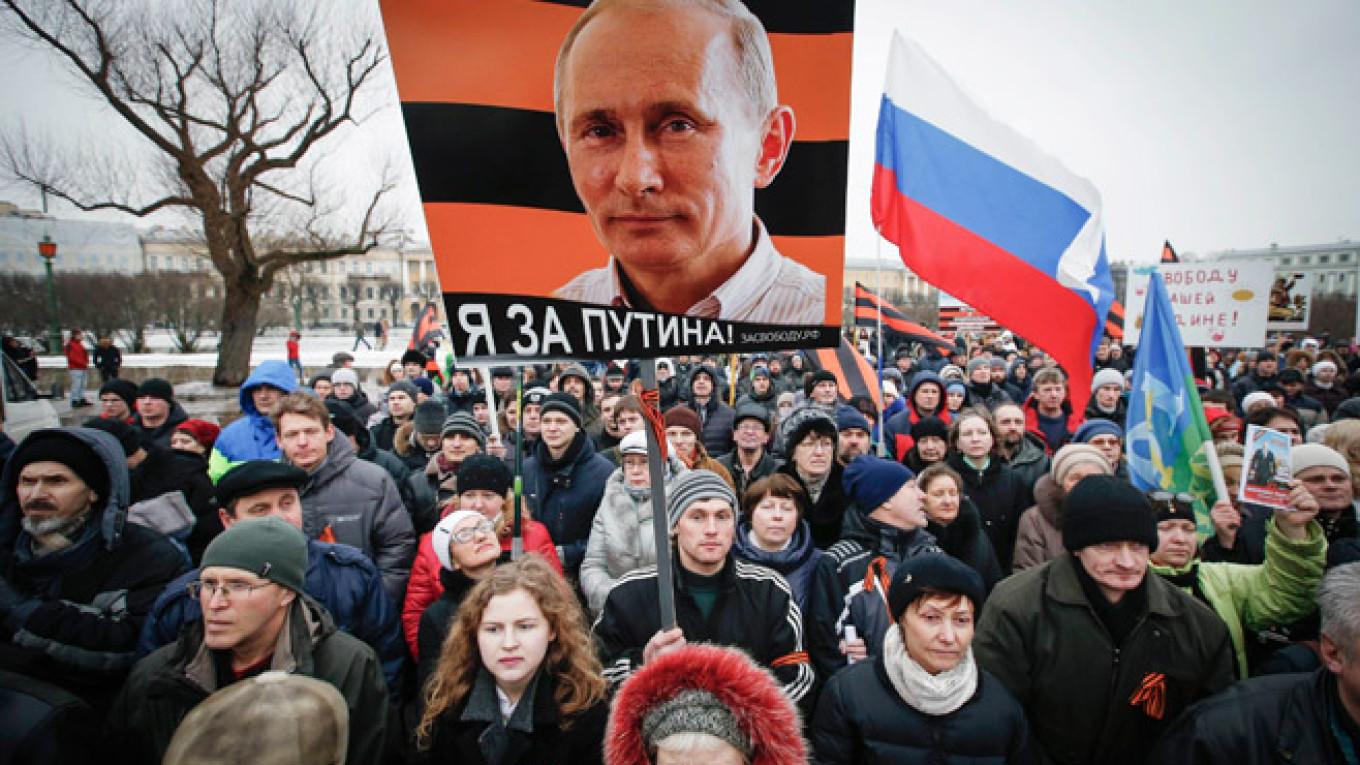Why do the Russian authorities enjoy such unusually high ratings and why does that popular support remain strong despite deteriorating social and economic conditions at home?
The system for controlling public opinion continues to operate flawlessly. The authorities use every form of mass media under their control to formulate the public agenda and the particular spin on each issue that best suits their purposes, and then makes a show of taking positions calculated to generate the widest possible voter approval — as surveys consistently confirm.
The system used by democratic countries does not work in Russia. That is, the system of first ascertaining what the people think and only afterward proposing solutions to those problems. That approach has some place in dealing with local issues, but when it comes to national policy, it is absolutely pointless: Only imaginary solutions can solve the imaginary problems presented by government propaganda.
And because the state itself creates the agenda and determines the public's perceptions, it will always stay three steps ahead of anyone attempting to form alternative strategies to the results of public opinion polls. By the time outside observers are just starting to collect information about society's attitude toward this or that problem, the authorities are already creating a new situation and the ready-made responses to it.
The most obvious example is the situation concerning Crimea. Recall that the subject was not even on the agenda prior to the events on Maidan in Kiev last year. Throughout recent years, only marginalized voices called for annexing Crimea and most Russian people never questioned to whom the peninsula belongs or why.
One year ago, the authorities not only included Crimea on the agenda, but made it the top priority. As a result, Russia's actions in Crimea served to rally most of the Russian people around the authorities.
The situation is the same regarding domestic matters such as gubernatorial elections. Society learns that elections are planned only after the authorities have already chosen a date that is most convenient for them, passed whatever legislation will best ensure the desired outcome and carefully orchestrated the entire process — from which candidates should win to the selection of "spoiler" candidates and the details of the media plan.
By the time the opposition learns of the elections, they have already lost critical preparation time — also part of the overall strategy of the authorities.
It is impossible to beat the authorities at their own game. The only way to change the situation is to create an alternative agenda and act in a way the authorities cannot foresee, thereby forcing them to respond.
That explains the turbulence of the mass protests in 2011-12: The authorities had not anticipated the power of the Internet as an alternative platform by which society could consolidate its demands on specific problems. That made it possible for a certain social movement to form that temporarily threw the authorities off balance.
However, they quickly and effectively corrected the problem and have since pushed the opposition back to the position it occupied in 2009-10.
Fortunately for the authorities, nobody is systematically and methodically looking for new ways to organize unexpected challenges to the ruling regime. They can relax: Their ratings will remain unusually high as long as resources remain to keep the current system of propaganda and coercion in good working order.
Fyodor Krasheninnikov is the president of the Institute for Development and Modernization of Public Relations in Yekaterinburg. This comment originally appeared in Vedomosti.
A Message from The Moscow Times:
Dear readers,
We are facing unprecedented challenges. Russia's Prosecutor General's Office has designated The Moscow Times as an "undesirable" organization, criminalizing our work and putting our staff at risk of prosecution. This follows our earlier unjust labeling as a "foreign agent."
These actions are direct attempts to silence independent journalism in Russia. The authorities claim our work "discredits the decisions of the Russian leadership." We see things differently: we strive to provide accurate, unbiased reporting on Russia.
We, the journalists of The Moscow Times, refuse to be silenced. But to continue our work, we need your help.
Your support, no matter how small, makes a world of difference. If you can, please support us monthly starting from just $2. It's quick to set up, and every contribution makes a significant impact.
By supporting The Moscow Times, you're defending open, independent journalism in the face of repression. Thank you for standing with us.
Remind me later.


